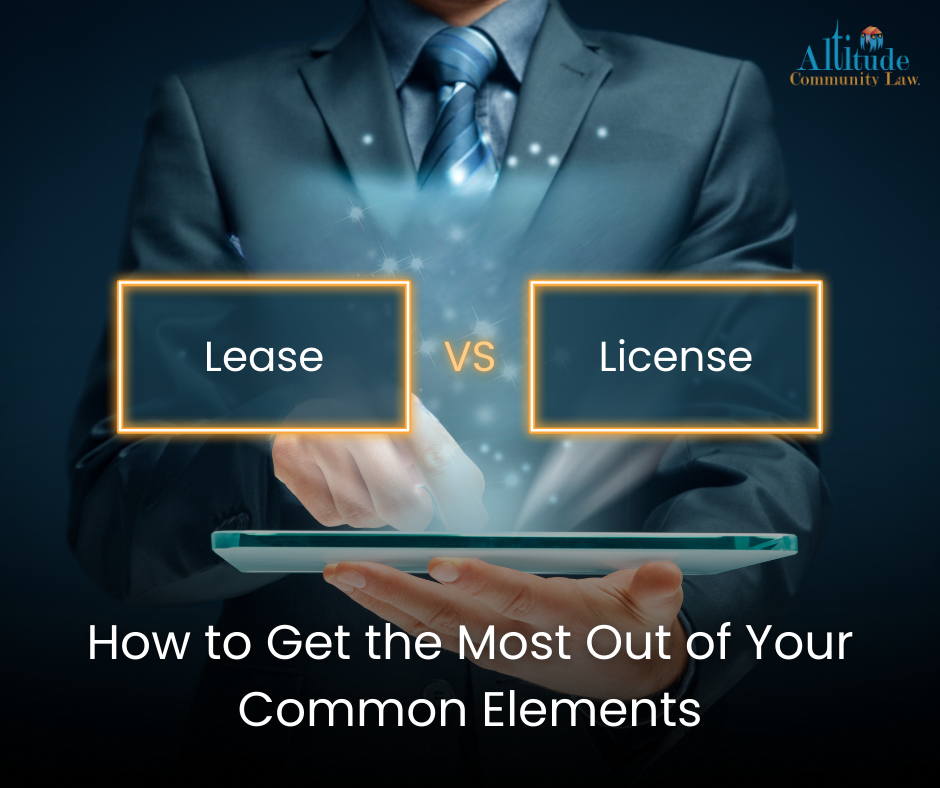
Does your association rent out parking spaces, storage sheds or a similar commodity to offset assessment needs? Leasing the right to use a particular common element to a resident can be a great source of additional income for a community association. However, leasing is not the only option. Instead, associations can license, rather than lease. Depending on the circumstances, a lease may be a bigger burden for the association than necessary.
But what is the difference between a lease and a license, and when should each type of agreement be used? Both a lease and a license grant the user the right to use the association’s property, but each have different levels of control and implications.
Right to Lease or License
Before discussing the differences, the association must have the right to lease or license the common element at issue. Generally speaking, Section 302 of the Colorado Common Interest Ownership Act (CCIOA) grants all associations the authority to adopt rules and regulations governing the common elements and the ability to lease or license them to individuals. For associations formed on or after July 1, 1992, no specific authorization in the declaration is needed to lease or license the common elements. If your association was formed before July 1, 1992, you should look for specific authorization in the governing documents to grant easements, leases, licenses and concessions through or over the common elements.
Regardless of when your association was formed, you should consult your association’s governing documents to determine the extent of this authority and whether there is any language limiting or restricting such action. For example, your association’s declaration may require homeowner approval in order to lease or license the common elements. If in doubt, consult with your association’s legal counsel.
Defining Lease vs. License
So, what is the difference?
A lease grants a resident the exclusive possession of the property for a defined period of time. This means that the resident can exclude others from the property, including the association, subject to the terms of the lease agreement. A lease transfers a real property interest and creates a landlord-tenant relationship. If the association wishes to terminate the lease, proper notice procedures must be followed pursuant to Colorado law, which would require a formal eviction.
A license grants a resident limited access or permission to use the property, but not necessarily exclusive possession. Licenses do not grant any ownership or real property interests, which means that the association retains control and can revoke the license at any time (subject to any notice requirements for termination). As no tenancy is created, the association is not bound by landlord-tenant law.
You can think of a license the same way we use tickets to concerts or sporting events – the ticket is a license that grants you access to the venue for the duration of the show. The ticket does not give us any rights outside of that limited use, and is essentially revoked when the event ends. If you overstay past the license period provided for by the ticket, you do not need to be evicted – you can be forcibly removed.
When to Use a Lease vs. License
A lease should be used when the association desires to create a long-term rental relationship with a resident. When leasing a common element to a resident, the association is granting that resident exclusive possession rights. Leases are also usually transferrable, meaning that the resident can sub-lease the common element to another resident in the community. Usually, leases create more stability for the association but grant the resident more control over the property. The exact arrangement is set forth in the lease.
That being said, licenses can be used for long or short-term relationships. Licenses are more flexible than leases, and are ideal for temporary use. Licenses do not grant exclusive possession, which means that the association will have the right to enter and control access to the property. This allows the association more control than if using a lease, and the association can revoke the license at will if necessary, subject to any notice requirements.
Terminating a Lease vs. License
Prior to terminating a lease, the association will be required to provide notice of non-renewal pursuant to Colorado law. Depending on how long the term of the lease is for, the resident is entitled to as much as 91 days’ notice prior to termination. If the resident fails to vacate the property after the notice period has ended, the association will be required to file an eviction lawsuit against the resident.
Licenses can be revoked or terminated at will, depending on any notice requirements contained in the actual agreement itself. For example, both parties can agree to give each other 30 days’ notice to terminate the license, as it is included in the agreement itself. While notice of termination is not legally required, almost all contracts provide for some type of notice period as a best practice.
Special Considerations for Parking Spaces
If your association rents the use of common element parking spaces, you must make sure that your community meets the latest towing notice and signage standards required by Colorado law. Even with a court order, a towing company will likely refuse to tow a vehicle from a parking space if the sign requirements have not been met. You can read more about the recent towing legislative changes here.
If your association currently desires to tow vehicles, we strongly recommend adopting a towing policy which outlines the enforcement options and legal requirements. You can find more information about the towing policy on our website.
If you have any questions about leases or licenses, please contact one of our Altitude attorneys at 303-432-9999 or email us at [email protected].